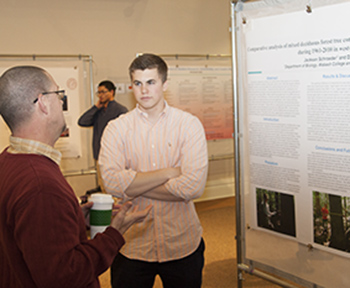Please click HERE for video of the Celebration.
Imagine being able to showcase the best your campus has to offer across all disciplines – the arts, sciences and humanities – all in one space.
Such things are possible at Wabash College, where today the school hosted its 14th annual Celebration of Student Research, Scholarship, and Creative Work.
Shoulder to shoulder, the whole of the liberal arts joined to celebrate outstanding works of student-driven research with scientists, rhetoricians and artists all supporting each other.
“I think an important part of the liberal arts is fostering a love of intellectual curiosity and a natural excitement about learning across the disciplines,” said Lon Porter, associate professor of chemistry and the chair of the Celebration planning committee. “The Celebration spotlights the amazing teaching and learning that transcends the traditional boundaries of the classroom.”
A total of 72 students participated in 64 presentations, featuring both oral reports, posters and exhibits, during the three-hour event.
Whether today’s presentations were the final step of the scientific method or an opening night performance, process was key, especially when the Detchon Center doors were opened to students, faculty, staff, members of the Board of Trustees and Board of Directors of the National Association of Wabash Men, and the general public.
That fact was not lost on Jackson Schroeder ’15, whose research focused on parasites found in freshwater fish in Indiana.
 “You have to ponder why things happen,” he said. “Think about the process. I had a great experience with my research. I learned a ton. You can write a paper, but the presentation is a huge part of it in explaining to everyday people and fellow students what exactly you did. It helps with your speaking abilities and being able to clearly communicate with others.”
“You have to ponder why things happen,” he said. “Think about the process. I had a great experience with my research. I learned a ton. You can write a paper, but the presentation is a huge part of it in explaining to everyday people and fellow students what exactly you did. It helps with your speaking abilities and being able to clearly communicate with others.”
Austin Althoff ’14, a part of two separate chemistry presentations, saw benefits in applying what he learned in class to real-world situations. He feels that’s the exact thing that separates the Wabash experience from others.
“You are provided a situation where you can apply the ideas and concepts you learn in the classroom in more of a technical setting and you see outcomes from that,” Althoff said. “It shows that you have great opportunities and Wabash is pushing students to more than just the typical undergrad classroom setting. You are out there doing research, which is something that helps to separate you from others.”
As is often the case, the shared experience of the scholarly endeavor linked the scientist and the artist. Artist John Vosel ’15 felt not unlike a scientist when a long bout of trial and error eventually led him to his preferred medium.
“Being an artist in this scenario is a little different,” said Vosel, “but the way I see it these experiences are similar because my process changed quite a bit during the semester. I bounced around – a lot of trial and error – until I found something that caught my eye. It wasn’t unlike the scientific method.”
The Celebration is the end point for many research pursuits. Creative writing major Steve Batchelder ’15 sees it as an opportunity for a new beginning. The sharing of ideas always leads to more creativity.
“It’s very important for your work to reach the point to where you feel like it can come to an end,” he said. “You set a date for it, and you have the gratification of sharing it with others. It gives you time to put that work behind you and look for new ideas and avenues of creativity. I like that we take the opportunity for students to present creative work. It makes our community stronger.”
Theater major Noah Eppler ’16 says the strength of the Wabash community helps fuel his efforts for outstanding work.
“It means a great deal to me that my peers can come by and see the work I’ve done,” Eppler said. “I’m absolutely passionate about anything relating to the performing arts, theater, and dance. Passion is an expression of authenticity, which I think audiences appreciate. It’s more than just compiling a 20-page research paper and submitting it to a professor for a grade. I can demonstrate to my peers how important this is to me.”
Porter echoed those thoughts. “I enjoy seeing the community come together to support the presenters and learn more about the amazing work done on our campus,” he said.
Despite a supportive audience, there were hints of nervousness, too. But collegiality prevailed on this day.
“I’m a little nervous to present,” said Batchelder, “but one of the comforts is that unlike class, where there are serious critiques of your work, today is all smiles.”
When asked of the benefits of the Celebration, Schroeder mentioned things like having a concrete hypothesis, consistent sample sizes, and being meticulous with data. Then he paused, smiled and said, “To be honest, you get to show off a little bit. I love that the College does this and it should continue. It’s one of the great things we do.”